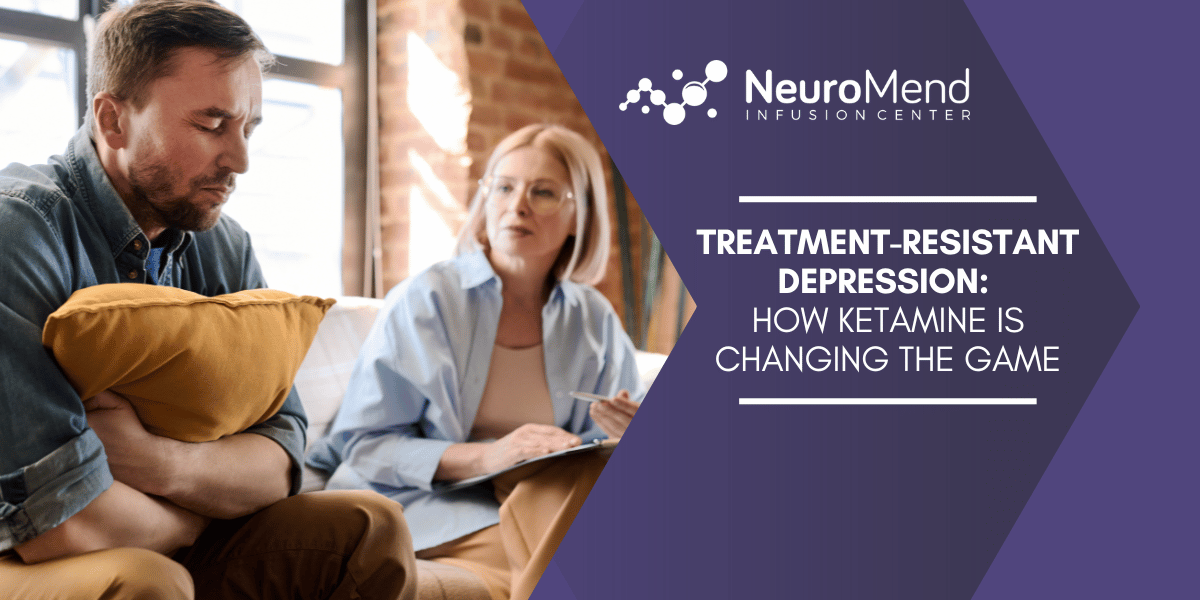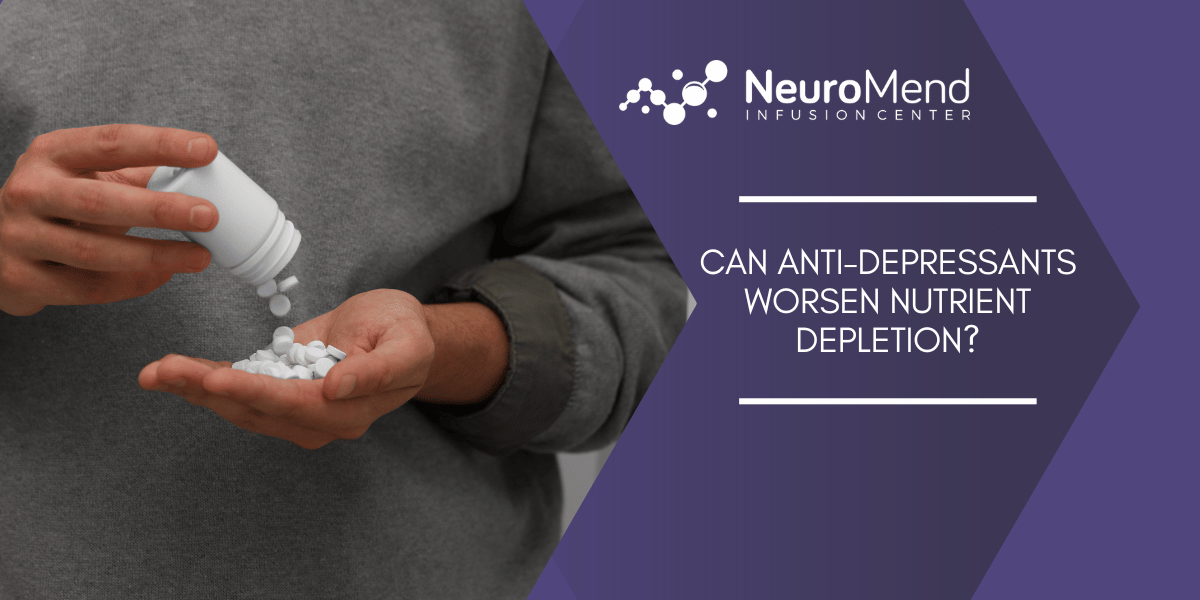.png?width=750&height=375&name=Blog%20-%20Gut%20Health%20(1).png)
The relationship between mental health and gut health has become a fascinating topic of research. The gut-brain axis, a communication network that links our gut and brain, plays a critical role in how we feel, think, and behave. It turns out that the bacteria in our gut not only impact digestion but also influence our mental health by interacting with key neurotransmitters.
In this blog post, we’ll explore how your gut and brain work together, how specific gut bacteria and nutrients can affect your mood, and why understanding this connection is essential for overall well-being.
- What is the Gut-Brain Axis?
- How Do Gut Bacteria Affect Your Mood?
- What Role Do Neurotransmitters Play in Mental Health?
- Why Does Your Gut Need Short-Chain Fatty Acids (SCFAs)?
- What is the Role of L-Glutamine in Gut and Mental Health?
- How Does IV Ketamine Therapy Tie into Gut and Mental Health?
- What Happens When Your Gut is Unhealthy?
- How Can You Improve Gut Health for Mental Well-being?
- What Does the Future Hold for Gut-Mental Health Research?
What is the Gut-Brain Axis?
The gut-brain axis refers to the constant communication between your digestive system and your brain. This two-way street allows your brain to send signals to your gut and vice versa, making it a crucial link for both physical and mental health.
Your gut is often referred to as your "second brain" because it produces many of the same neurotransmitters, like serotonin and dopamine, that your brain does. These neurotransmitters are essential for regulating mood, sleep, and stress. The bacteria in your gut, known as the gut microbiome, play a major role in how these chemicals are produced and distributed throughout your body. Disruptions in this communication can lead to mood disorders such as anxiety and depression.
How Do Gut Bacteria Affect Your Mood?
Gut bacteria have a significant influence on neurotransmitter production, impacting mental health in profound ways. For example, specific strains of bacteria like bifidobacterium breve, bifidobacterium longum, lactobacillus helveticus, and lactobacillus rhamnosus are known for their mood-boosting properties. These probiotics help maintain a balanced gut microbiome, which is essential for optimal brain function.
In particular, bifidobacterium species can enhance the production of gamma-aminobutyric acid (GABA), a neurotransmitter that calms the brain and reduces anxiety. Similarly, lactobacillus species have been shown to positively influence serotonin levels, the "feel-good" neurotransmitter that regulates mood and happiness. A healthy gut means your brain receives the right signals, keeping mental health issues at bay.
What Role Do Neurotransmitters Play in Mental Health?
Neurotransmitters are chemicals that transmit signals between nerve cells and are vital to mental health. When your gut is healthy, these chemicals are produced efficiently, supporting a positive mood and mental clarity. Let’s break down some key neurotransmitters:
-
Serotonin: Known as the happiness hormone, serotonin regulates mood, sleep, and appetite. Interestingly, around 90% of serotonin is produced in your gut, not your brain. This production is stimulated by butyrate, a short-chain fatty acid (SCFA) made in the gut. Without adequate butyrate, serotonin levels can drop, leading to feelings of depression and anxiety.
-
Dopamine: This neurotransmitter is associated with pleasure and motivation. An imbalance in dopamine levels can lead to low motivation and fatigue, often contributing to mental health disorders like depression.
-
GABA: GABA reduces brain activity and promotes relaxation. It’s made from glutamate, but the presence of beneficial bacteria like lactobacillus and bifidobacterium is necessary for its production. Without these bacteria, you may experience higher stress and anxiety.
-
Norepinephrine, histamine, and glutamate: These neurotransmitters are also impacted by gut health. They regulate attention, stress response, and brain activity. If your gut is unbalanced, it can throw these chemicals off, contributing to poor mental health.
Why Does Your Gut Need Short-Chain Fatty Acids (SCFAs)?
SCFAs, like butyrate, acetate, and propionate, are produced when fiber is fermented in the colon by gut bacteria. These fatty acids serve as fuel for your gut cells and are essential for a healthy digestive lining. But beyond that, SCFAs also play a crucial role in producing neurotransmitters that affect brain function and mood.
For example, butyrate not only nourishes your gut lining but also stimulates the production of serotonin, the neurotransmitter that boosts happiness. Without sufficient SCFAs, your body struggles to produce the chemicals it needs for optimal mental health, which can lead to anxiety, depression, or other mood disorders.
What is the Role of L-Glutamine in Gut and Mental Health?
L-Glutamine is an amino acid that supports the integrity of the gut lining. It helps repair and maintain the gut barrier, which prevents harmful substances from leaking into the bloodstream, a condition known as "leaky gut."
L-Glutamine is essential for maintaining a balanced gut microbiome, which is necessary for proper neurotransmitter production. Since neurotransmitters like serotonin, dopamine, GABA, norepinephrine, and histamine are directly affected by gut health, L-Glutamine’s role in repairing the gut lining is critical. If your gut lining is compromised, it can lead to inflammation, which has been linked to mental health issues such as anxiety, depression, and even cognitive decline.
How Does IV Ketamine Therapy Tie into Gut and Mental Health?
IV Ketamine therapy is emerging as a treatment for severe depression and anxiety. But did you know it also impacts the gut-brain axis? Ketamine's rapid antidepressant effects are believed to result, in part, from its ability to increase neuroplasticity and regulate neurotransmitter levels, including serotonin and GABA.
Moreover, since the gut plays a role in the production of these neurotransmitters, a healthy gut may enhance the effectiveness of treatments like ketamine. Ongoing research is looking at how gut health can improve outcomes in mental health therapies.

What Happens When Your Gut is Unhealthy?
An unhealthy gut can disrupt the production of neurotransmitters, leading to mental health challenges. Gut imbalances, often caused by poor diet, stress, or antibiotics, can result in a drop in beneficial bacteria like bifidobacterium breve and lactobacillus rhamnosus. Without these bacteria, neurotransmitter production suffers, causing mood disorders, anxiety, and even cognitive issues like brain fog.
In addition, an unhealthy gut can lead to increased gut permeability, or "leaky gut," which triggers inflammation. Inflammation is closely tied to mood disorders, making it even more important to maintain gut health for a balanced mental state.
How Can You Improve Gut Health for Mental Well-being?
Maintaining a healthy gut is key to improving mental health. A diet rich in fiber and fermented foods can boost SCFA production and support the growth of beneficial bacteria like lactobacillus helveticus and bifidobacterium longum.
You can also consider taking a probiotic supplement to restore the balance of your gut bacteria. Adding nutrients like L-Glutamine can also help repair the gut lining and improve neurotransmitter production, making it easier to maintain a positive mood and mental clarity.
What Does the Future Hold for Gut-Mental Health Research?
As research into the gut-brain axis continues, we’re learning more about how closely our gut health is tied to mental health. Scientists are looking into how specific strains of bacteria can be used to treat depression and anxiety, and how improving gut health can make treatments like IV ketamine therapy more effective.
The future is promising, and as we uncover more about this complex relationship, it’s clear that taking care of your gut isn’t just about digestion—it’s about your mental well-being too.
Take Charge of Your Gut and Mind with Neuromend
The gut-brain axis is a powerful system that shows how intertwined our mental health is with our gut health. By understanding the role of neurotransmitters, beneficial bacteria, and nutrients like L-Glutamine, we can take steps to improve both our gut and mental well-being. Prioritizing gut health may be the key to unlocking better mental clarity, mood stability, and even more effective mental health treatments.
At NeuroMend, we specialize in cutting-edge therapies that optimize both mental and physical health. Contact us today for a free consultation to learn how we can help improve your gut-brain balance and overall well-being.
ABOUT NEUROMEND INFUSION CENTER
![]() We are an Evidence-Based Center of Excellence and the leading provider of Ketamine Infusions, IV Infusions and Ketamine Consulting Services for Ketamine Clinics and IV Therapy Clinics.
We are an Evidence-Based Center of Excellence and the leading provider of Ketamine Infusions, IV Infusions and Ketamine Consulting Services for Ketamine Clinics and IV Therapy Clinics.
We Provide Effective Treatment For The Following Conditions: Major Depressive Disorders, Post-traumatic Stress Disorder (PTSD), Bipolar Depression, Obsessive Compulsive Disorder, Suicidal Ideations, Chronic Migraines, Severe Anxiety, Fibromyalgia and Chronic Pain Syndromes.










